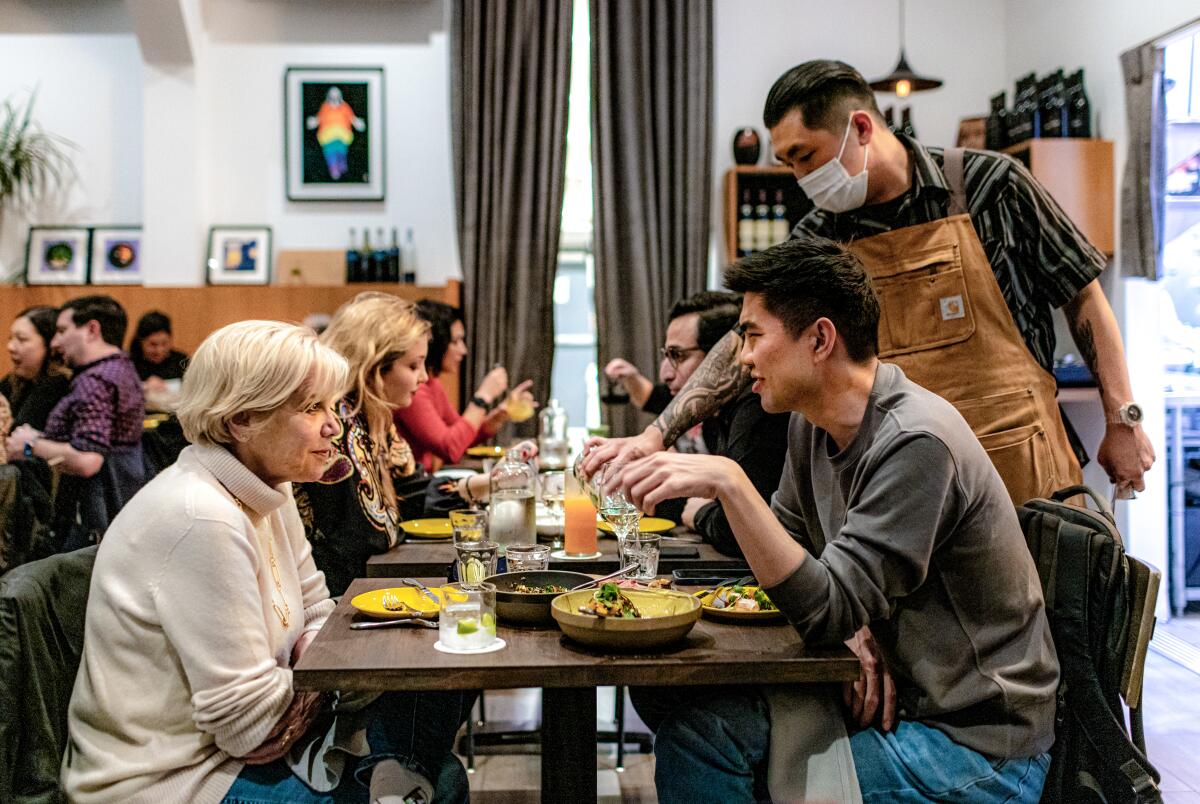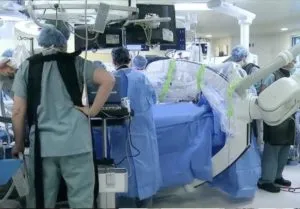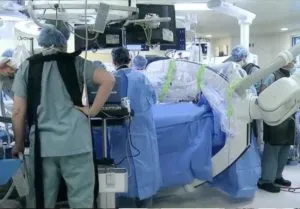P4. We ordered a salad, but there were tiny black specks in the food – we went straight to the hospital
Dining out is often a joyful experience, offering people a break from routine, a chance to socialize, and an opportunity to try new flavors. But occasionally, something unexpected can happen—such as discovering unusual substances or particles in a dish that raise food safety concerns.
This article recounts a real-life dining experience involving an unexpected discovery in a restaurant salad. More importantly, it provides practical guidance on what to do in such a situation, supported by verified health and safety recommendations from food regulatory authorities.
A Dining Experience That Took a Concerning Turn
A recent evening out at a popular city-center restaurant took a surprising turn for two friends who had been enjoying what was expected to be a relaxing dinner. While savoring a freshly plated avocado and quinoa salad, one of them noticed something unusual: tiny black specks scattered across the top of the greens.
At first glance, the specks resembled chia seeds or coarse ground pepper—both common ingredients in modern cuisine. But upon closer inspection, the specks appeared to move slightly, prompting alarm.
In response, they immediately alerted the restaurant staff and requested clarification. With caution in mind and a desire to ensure safety, they decided to visit a nearby hospital to rule out any adverse reactions or risks.

What Should You Do If You Find Foreign Particles in Food?
Discovering an unexpected substance in your food can be unsettling. According to the U.S. Food and Drug Administration (FDA), foreign objects in food—whether they’re insects, plastic fragments, or other contaminants—can occur due to a variety of reasons, including packaging errors, cross-contamination during preparation, or food storage conditions.
Here are the recommended steps to take if you find anything unusual in your meal:
1. Do Not Consume the Food Further
If something looks or smells off, stop eating immediately. Consuming contaminated food can pose a health risk, especially for people with weakened immune systems, children, and older adults.
2. Notify the Staff
Politely inform the waiter or manager. Most restaurants have food safety protocols in place and will escalate the issue to the kitchen or quality control.
3. Document the Evidence
If possible, take photos of the food and keep your receipt. This documentation can be helpful if you need to report the incident to health authorities or the restaurant’s corporate office.
4. Preserve the Food Sample
If the situation appears serious (e.g., if insects, sharp objects, or unknown materials are involved), request the item be stored safely or consider taking the sample with you in a sealed container, if permitted.
5. Seek Medical Advice if Needed
If you feel unwell or suspect you’ve consumed something harmful, contact your healthcare provider or visit the nearest hospital. In some cases, early medical evaluation can prevent more serious complications.

Common Causes of Foreign Matter in Food
According to the CDC, food contamination can be biological, chemical, or physical in nature. Physical contamination refers to the presence of unwanted objects in food, such as:
- Insects or insect fragments (can occur in fresh produce not washed thoroughly)
- Hair or fibers
- Plastic or metal fragments
- Stones or dirt from vegetables or grains
These contaminants can enter the food during various stages of production or preparation. Fresh produce, especially when served raw, should always be washed properly to minimize risks.

Food Safety in Restaurants: What Regulations Apply?
In the United States, the FDA Food Code provides science-based guidelines to promote food safety in retail and food service environments. Restaurants are required to:
- Maintain clean and sanitary food prep areas
- Store food at appropriate temperatures
- Train staff in hygiene and handling protocols
- Use pest control measures
- Monitor food safety using hazard analysis and critical control point (HACCP) systems
In the UK, the Food Standards Agency (FSA) carries out similar roles, including inspections, consumer alerts, and enforcement of hygiene standards in commercial kitchens.
If you encounter a serious issue at a food establishment, both the FDA and FSA encourage reporting the incident to your local health department for further investigation.
What Are the Health Risks of Eating Contaminated Food?
Most food contamination incidents are low risk and may cause only mild symptoms like stomach discomfort. However, there are certain risks depending on the nature of the contamination:
- Biological risks (e.g., bacteria, parasites): may lead to foodborne illnesses like salmonella or E. coli
- Chemical risks (e.g., cleaning agents): can cause nausea, vomiting, or allergic reactions
- Physical risks (e.g., glass or metal): may cause injury to the mouth, throat, or digestive tract
Prompt medical attention is recommended if you experience symptoms like abdominal pain, vomiting, fever, or difficulty swallowing after eating contaminated food.

Tips to Stay Safe When Dining Out
While restaurants are generally safe, diners can take precautions to reduce the risk of food safety incidents:
- Look at hygiene ratings: Check the restaurant’s health inspection score online or on local authority websites
- Observe cleanliness: A clean dining area often reflects good kitchen practices
- Review the food carefully: If something looks off (strange odor, texture, or color), don’t hesitate to ask questions
- Watch for allergens: If you have food allergies, always inform your server and double-check ingredient lists

Conclusion: Awareness is Key to Safe Dining
While rare, discovering a foreign object in your meal can be an alarming experience. Fortunately, food safety regulations in most countries are designed to minimize such risks and encourage prompt resolution when they occur. By staying vigilant and knowing the right steps to take, diners can protect themselves and contribute to higher safety standards in the food service industry.
If you experience or witness a food safety issue in a restaurant, report it to your local food safety authority or health department. In the U.S., you can also use the FDA’s Safety Reporting Portal.
Verified Sources:
- U.S. Food and Drug Administration (FDA) – Food Safety
- Centers for Disease Control and Prevention – Food Safety
- World Health Organization – Foodborne Diseases
- UK Food Standards Agency (FSA)
Related articles
The Latest
P4. SH0CK THE SHOWBIZ WORLD!! Beyoncé’s daughter Blue Ivy has revealed she’s...
A Rumor That Sparked Online Chaos In early July 2025, an unverified article began circulating online, claiming that Blue Ivy Carter, the 13-year-old daughter of Beyoncé and Jay-Z, was three months pregnant. The story spread quickly, fueled by dramatic headlines and ...
P2. SH0CK THE SHOWBIZ WORLD!! Beyoncé’s daughter Blue Ivy has revealed she’s...
A Rumor That Sparked Online Chaos In early July 2025, an unverified article began circulating online, claiming that Blue Ivy Carter, the 13-year-old daughter of Beyoncé and Jay-Z, was three months pregnant. The story spread quickly, fueled by dramatic headlines and ...
P1. SH0CK THE SHOWBIZ WORLD!! Beyoncé’s daughter Blue Ivy has revealed she’s...
A Rumor That Sparked Online Chaos In early July 2025, an unverified article began circulating online, claiming that Blue Ivy Carter, the 13-year-old daughter of Beyoncé and Jay-Z, was three months pregnant. The story spread quickly, fueled by dramatic headlines and ...
P4. Girl had to be hospitalized for wanting to use a pe...See more
It was an ordinary day for Emily, just like any other, when she went about her usual routine. She had been using tampons for years and had always considered it a simple, practical way to manage her period. But everything ...
P2. Girl had to be hospitalized for wanting to use a pe...See more
It was an ordinary day for Emily, just like any other, when she went about her usual routine. She had been using tampons for years and had always considered it a simple, practical way to manage her period. But everything ...
 P2. A man who divorced his wife of 47 years begs for her -
P2. A man who divorced his wife of 47 years begs for her - P1. WOMEN who do this to their partner are the most… See more
P1. WOMEN who do this to their partner are the most… See more-1750342443-q80.webp) P3. The day a mysterious message changed my world
P3. The day a mysterious message changed my world F. Is toilet paper coming to an end? It may soon take the place of our regular rolls.
F. Is toilet paper coming to an end? It may soon take the place of our regular rolls.






-1750411433-q80.webp)


